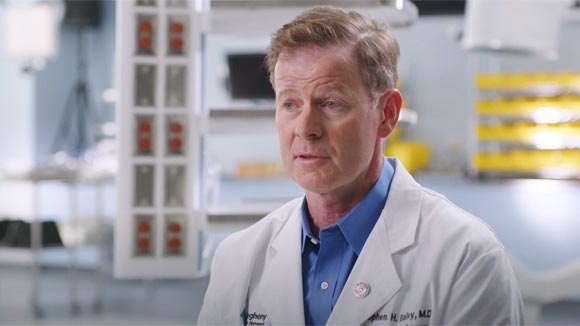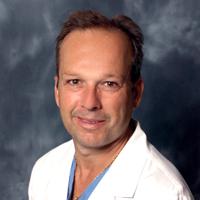Learn more about our appointment options, second opinions, locations, referrals, and resources.
Aortic Valve Program
AHN Aortic Valve Program overview
Heart valve disease happens when at least one of the heart’s four valves is damaged or doesn't pump blood properly. The aortic valve is one of four valves within the heart that helps to maintain proper blood flow through the heart into the aorta. If the aortic valve is damaged or diseased, the heart has to work harder to provide blood to the rest of the body. As a result, the heart works harder to deliver oxygen- and nutrient-rich blood to the body’s vital organs and tissue.
Aortic valve disease may be caused by a congenital (present from birth) heart defect or various conditions. When the aortic valve is diseased, its malfunction can also cause damage to the lining of the aorta. This can cause the wall of the aorta to stretch or tear.
The AHN Aortic Valve Program focuses specifically on the aortic valve because there are issues and treatment options unique to this specific heart valve. Our top aortic valve surgeons and specialists from different backgrounds work together to provide individualized care for patients with aortic valve issues. By focusing on aortic valve disease, we can help people experiencing one or more conditions related to the heart’s valves.
Our multidisciplinary program offers a range of treatment options that aim to ease symptoms. Minimally invasive valve replacement surgery and other treatments can help improve heart function and reduce the risk of heart failure. Depending on your diagnosis, the following divisions may be involved:
- Cardiac Surgery Division
- Interventional Cardiology Division
- Cardiovascular Imaging Division
- General Cardiology Division
How we treat aortic valve conditions
We stay up to date on the latest treatments and innovations for aortic valve replacement management and repair. From initial diagnosis to aortic valve replacement aftercare, our highly experienced specialists are here to help every step of the way.
Conditions we treat
The AHN Aortic Valve Program treats the following conditions:
- Aortic insufficiency: This happens when the aortic valve doesn’t close correctly, which allows blood to leak backward.
- Aortic stenosis: The most common type of valve condition, aortic stenosis is a serious problem that restricts blood flow to the aorta due to a narrowing in the opening of the aortic valve.
- Bicuspid aortic valve disease: An aortic valve that consists of only two flaps instead of its usual three. If further complications arise — such as heart failure, aortic stenosis, or aortic regurgitation — the condition is called bicuspid aortic valve disease and requires bicuspid aortic valve management.
- Aortic valve endocarditis: This happens when the heart’s inner lining becomes inflamed. This is a serious condition typically caused by an infection within the body.
- Aortic aneurysm or dissection: The aorta is the main artery of the body which supplies oxygen-rich blood to the circulatory system. The blood leaves the heart through the aortic valve and travels through the aorta to the rest of the body. If the lining of the aorta becomes damaged, dilated, or weakened, it may require medication adjustment or even surgery. Learn more about aortic aneurysm or dissection.

“Part of the whole evaluation and treatment planning is being cared for by a multidisciplinary team that has expertise in a whole variety of treatment options, and great understanding and experience in matching a person’s clinical circumstance and clinical anatomy with the best treatment for them.”
— Dr. Stephen H. Bailey, Thoracic and Cardiac Surgery
Aortic valve treatment
We offer treatments for even the most complex forms of valve disease — including high-risk patients. By using state-of-the-art devices and offering procedures like transcatheter aortic valve replacement, we can treat even more complicated situations.
In addition to traditional treatment options, the AHN Cardiovascular Institute also provides the following procedures for aortic valve replacement management and repair, including:
- Standard valve replacement. Surgical aortic valve replacement surgery is performed through an open chest incision while the patient’s heart is placed on a heart-lung bypass machine.
- Minimally invasive valve replacement. A procedure involving either a small incision between the ribs or a partial opening of the chest, and high-definition 3D video monitoring. This method often results in minimal scarring, less pain, shorter hospital stays, and quicker recovery.
- Transcatheter aortic valve replacement. A procedure that replaces a diseased or damaged aortic valve with an artificial valve. This procedure typically involves no incisions and is performed through an artery in the groin. Learn more about transcatheter aortic valve replacement.
- Balloon valvuloplasty. A temporizing minimally invasive procedure that uses a balloon-tipped catheter to widen a narrow heart valve.
By accessing this video, I understand that I am leaving the AHN website and I will be re-directed to an external website operated by a third party platform provider. I acknowledge that the platform provider may collect personal information about me, and about the video that I view, on their platform and may use and disclose this information in accordance with its privacy policy. I agree that Allegheny Health Network is not responsible for the data collection and use practices of this third party.
Why choose us?
Our program combines the best aortic valve replacement surgeons with highly skilled teams from several medical specialties. Our patients choose us because of our:
Efficiency
We provide the most advanced options for imaging and testing. This allows specialists to provide an accurate diagnosis.
Coordination
You’ll meet with several specialists to help determine the best course of treatment for your conditions. Our team works together to review your diagnosis, progress, and management to ensure we consider all treatment options for your unique care plan.
Customized treatment plans
Based on a custom aortic valve replacement care plan, we closely monitor you with periodic checkups and provide suggestions for lifestyle changes, new therapies, and medications that may slow the progression of a condition and help avoid surgery altogether.
Expertise
Our team of aortic valve specialists includes vascular and cardiac surgeons, aortic pathologists, radiologists, and cardiologists who use advanced technologies to identify aortic conditions and the latest methods to treat them.
Our program leaders include:

Chair, Cardiovascular Institute
Chair, Department of Thoracic and Cardiovascular Surgery
Allegheny Health Network

Director of Interventional Cardiology
Allegheny Health Network
AHN Aortic Valve Program appointments and information
Not yet diagnosed
If you don’t have a diagnosis, call (412) DOCTORS (412) 362-8677 to make an appointment with your primary care physician (PCP). They will explore all possible causes of your symptoms.
Second opinions or ready to schedule treatment
Connect directly with our aortic valve specialists at one of our AHN Aortic Valve Clinics.
AHN Allegheny General Hospital
320 East North Avenue, CVI-1
Pittsburgh, PA 15212
(412) 359-8820
GET DIRECTIONS
AHN Jefferson Hospital
575 Coal Valley Road, MOB Suite 504
Jefferson Hills, PA 15025
(412) 469-7900
GET DIRECTIONS
AHN Forbes Hospital
2566 Haymaker Road, Suite 201
Pittsburgh, PA 15146
(412) 858-7088
GET DIRECTIONS
AHN Saint Vincent Hospital
2315 Myrtle Street, Suite 190
Erie, PA 16502
(814) 456-9197
GET DIRECTIONS
Aortic valve research
AHN Cardiovascular Research Institute
AHN’s Cardiovascular Research Institute is established on more than 100 years of innovation with diverse areas of focus, including research for the latest heart disease treatments and cardiac technology. Our qualified team and heart valve specialists take pride in using state-of-the-art devices, technology, and therapies to help revolutionize care for heart disease.
What is a clinical trial?
Clinical trials are special research opportunities that explore medical treatments, strategies, or devices to ensure they’re safe and effective for human use.
Active clinical trials
By prioritizing research and innovation, our physicians and patients are engaged in more than 100 national and international clinical trials. Participating in these trials gives AHN patients special access to some of the newest potential treatment options for heart failure. Participation in clinical trials is based on meeting eligibility criteria.
To express interest in a clinical trial or to learn more about research opportunities, check out our active clinical trials.
Aortic Valve Program referral information for health care professionals
Refer your patient to the AHN Aortic Valve Program
Non-AHN providers can submit a referral online or by calling (844) MD-REFER (844) 637-3337.
Non-AHN providers can use the EpicCare® Link™ platform to view updates on their patients’ care within AHN after the initial referral is completed.
Medical records
If you need access to specific test results or imaging not provided in the EpicCare® Link™ platform, please fill out a medical record request form.
EpicCare® is a registered trademark of Epic Systems Corporation and used with permission.
EpicCare® Link™ is a trademark of Epic Systems Corporation and used with permission.

